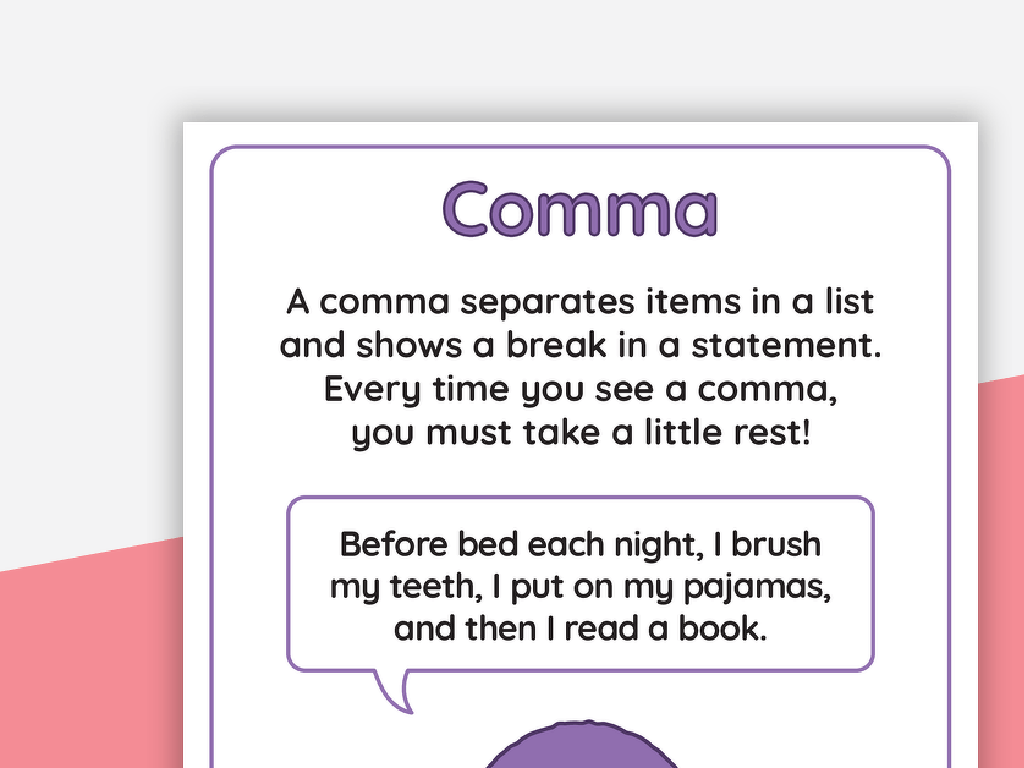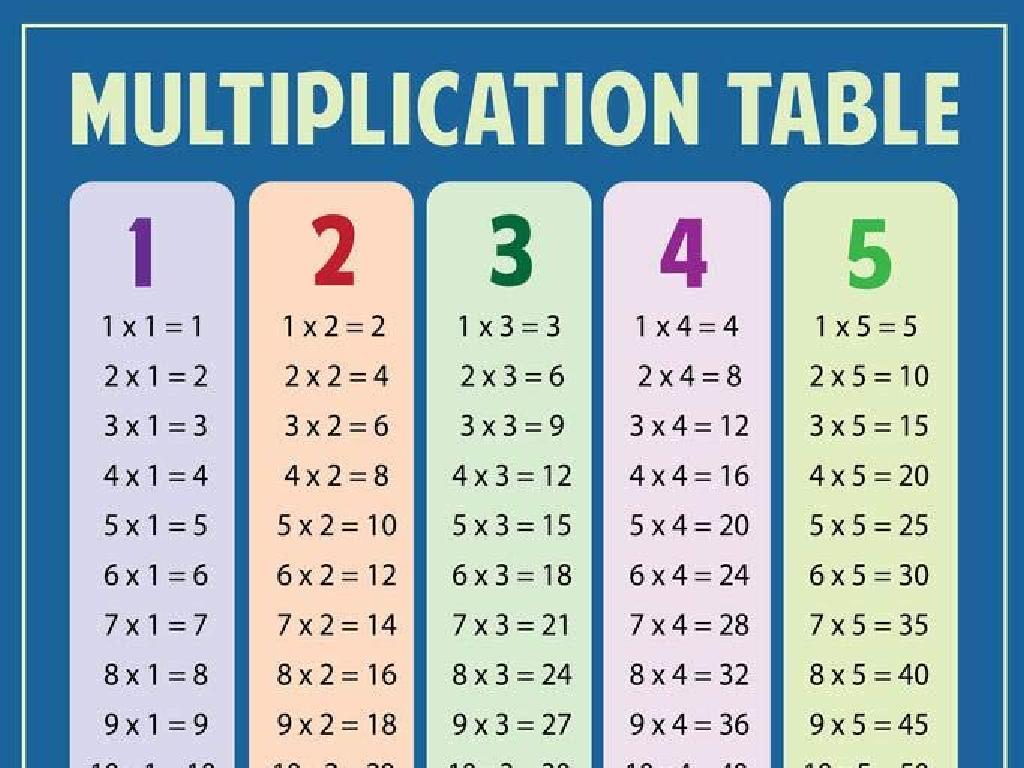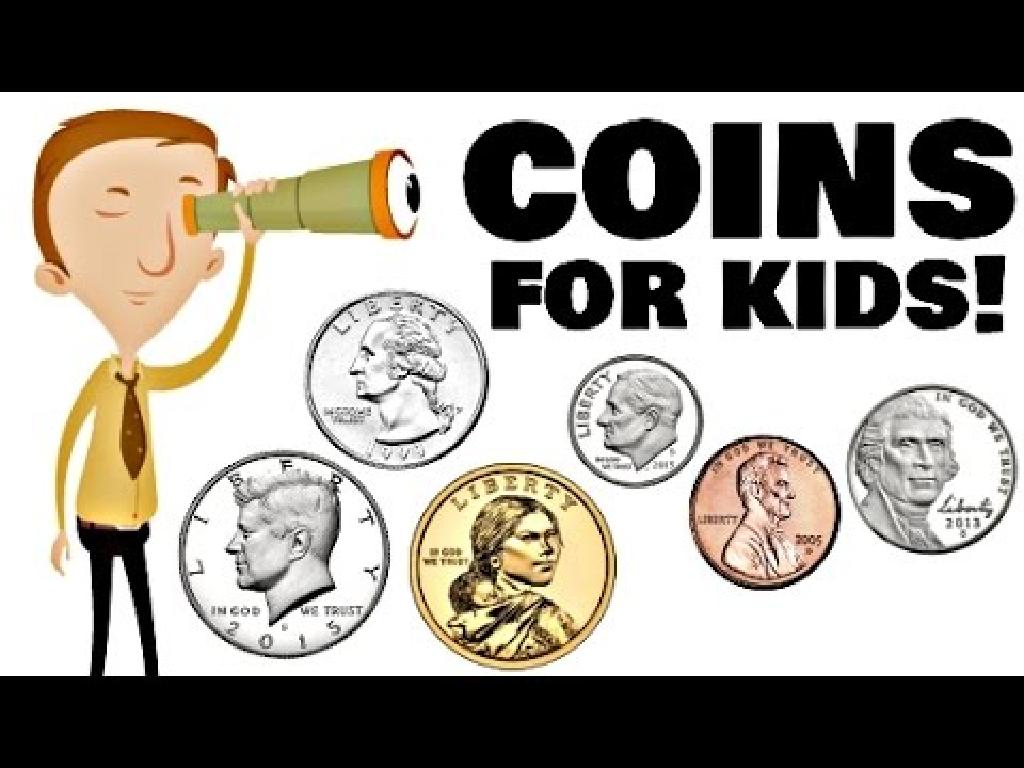Correct Capitalization Errors
Subject: Language arts
Grade: Sixth grade
Topic: Capitalization
Please LOG IN to download the presentation. Access is available to registered users only.
View More Content
Welcome to Capitalization!
– Importance of capitalization
– Capitalization helps convey respect and proper nouns.
– Rules for using capital letters
– We capitalize the first word of a sentence, names, and places.
– Capitalization in sentences
– Look at examples where capitals are used and where they’re not.
– Practice capitalizing correctly
– We’ll do exercises to reinforce the rules.
|
This slide introduces the concept of capitalization, which is crucial for proper writing and communication. Capitalization is not just a matter of grammar but also of showing respect and attention to detail. It’s important to highlight the basic rules, such as capitalizing the first word of a sentence, names of people, specific places, and important words in titles. Provide clear examples to illustrate these rules, and prepare a few sentences for the students to practice capitalizing correctly. Encourage students to understand that capitalization helps readers understand the text better and that it can change the meaning of a sentence. The practice exercises should include a variety of examples to ensure students can apply the rules in different contexts.
Mastering Capitalization Rules
– Begin sentences with capital letters
– Capitalize names of people and places
– For example: ‘Jordan’ or ‘Mount Everest’
– Days and months get capitals, not seasons
– For instance: ‘Monday’ or ‘January’, but not ‘spring’
– Use capitals for specific things
– Like ‘Titanic’ or ‘Sahara Desert’
|
This slide aims to solidify the understanding of basic capitalization rules among sixth-grade students. Emphasize that every sentence should start with a capital letter to signal its beginning. Proper nouns, which are specific names for people, places, and things, always need to be capitalized. This includes personal names, countries, cities, and landmarks. When it comes to days and months, they are always capitalized because they are proper nouns, but seasons are not unless they’re part of a title. Use examples to illustrate each rule and encourage students to come up with additional examples. In the next class, consider having students work in pairs to find capitalization errors in a paragraph you provide.
Capitalizing Titles and Headings
– Capitalize main words in titles
– Like ‘Harry Potter and the Sorcerer’s Stone’
– Exclude short prepositions, articles
– Words like ‘of’, ‘the’, ‘and’
– Conjunctions remain lowercase
– ‘but’, ‘or’, ‘yet’ are not capitalized
– First word always capitalized
|
When teaching capitalization for titles and headings, emphasize the importance of distinguishing between major words and minor words. Major words, including nouns, verbs, adjectives, and adverbs, should be capitalized. However, students should not capitalize short prepositions (e.g., ‘in’, ‘on’), articles (‘a’, ‘an’, ‘the’), or conjunctions (‘and’, ‘but’, ‘for’) unless they are the first word in the title. Use book titles as examples to illustrate these rules. Encourage students to practice by writing down titles and correcting the capitalization, and prepare exercises where they can apply these rules.
Mastering Capital Letters in Sentences
– Capitalization rules in sentences
– Examples of proper capital use
– ‘I visited the Eiffel Tower in Paris.’ – ‘Eiffel Tower’ and ‘Paris’ are capitalized.
– Common capitalization mistakes
– Not capitalizing proper nouns or starting a sentence. Example: ‘susan loves paris.’ should be ‘Susan loves Paris.’
– Tips to avoid errors
– Always start sentences with a capital and use it for names, places, and titles.
|
This slide aims to teach students the importance of using capital letters correctly within sentences. Begin by explaining the basic rules of capitalization, such as starting sentences with a capital letter and capitalizing proper nouns. Provide clear examples to illustrate correct usage. Discuss common errors, like forgetting to capitalize names and places, or the first word in a sentence. Offer practical tips to help students remember the rules, such as re-reading their sentences to check for capitals and paying special attention to names and titles. Encourage students to practice by writing sentences and checking each other’s work for capitalization errors.
Capitalization in Special Cases
– Always capitalize ‘I’ when alone
– It’s not ‘i’, but ‘I’ when referring to oneself
– Capitalize family titles as names
– ‘Mom’ and ‘Grandpa’ but not ‘my mom’ or ‘my grandpa’
– Use capitals for days and months
– Capitalize historical events and documents
|
This slide focuses on teaching students the nuances of capitalization rules in English. Emphasize that the pronoun ‘I’ is always capitalized, regardless of its position in a sentence. When it comes to family relationships, students should learn that titles like ‘Mom’ and ‘Dad’ are capitalized when they’re used in place of a person’s name, but not when they’re preceded by a possessive pronoun. Additionally, extend the lesson to include capitalization of days, months, historical events, and documents to provide a broader understanding of capitalization rules. Encourage students to practice by writing sentences that correctly use these capitalization rules.
Let’s Practice Capitalization!
– Correct capitalization in given sentences
– Look for the first word of sentences and proper nouns.
– Create sentences with correct capitalization
– Use names, places, and start of sentences as a guide.
– Understand the importance of proper nouns
– Share your sentences with the class
– Get ready to present your sentences to everyone.
|
This slide is for a class activity focused on practicing capitalization. Students will first correct sentences with capitalization errors. Emphasize the importance of capitalizing the first word in a sentence, proper nouns, titles, and days of the week. After correcting errors, students should create their own sentences that demonstrate their understanding of proper capitalization rules. Encourage creativity and the use of a variety of proper nouns. As a follow-up, students will share their sentences with the class, which will reinforce their learning and allow for peer feedback. Prepare to guide the students through the activity, offering examples and assistance as needed.
Class Activity: Capitalization Hunt
– Search for capitalization around you
– Pair up and list proper nouns and titles
– Look for names, places, and titles on classroom items
– Discuss the capitalization reasons
– Why are ‘Mount Everest’ and ‘Harry Potter’ capitalized?
– Reflect on the importance of correct capitalization
|
This activity is designed to make students aware of the practical use of capitalization in their everyday environment. By working in pairs, students will engage in a scavenger hunt to find examples of capitalization on classroom objects like posters, books, and labels. They will list proper nouns and titles, fostering collaboration and attention to detail. After gathering examples, lead a discussion on why certain words are capitalized, reinforcing the rules of capitalization. This will help them understand the significance of capitalization in distinguishing proper nouns from common nouns and in showing respect for individuals and places. Encourage students to share their findings and provide guidance on the nuances of capitalization. Possible activities for different pairs could include focusing on specific categories such as book titles, geographical locations, days of the week, or months.
Review and Reflect: Capitalization Rules
– Recap main capitalization rules
– Always capitalize the first word of a sentence, names, and places.
– Share findings from Capitalization Hunt
– What unusual or tricky examples did you find during the activity?
– Discuss importance of capitalization
– Proper capitalization helps convey respect and understanding.
– Reflect on today’s lessons
|
As we wrap up today’s lesson, let’s go over the key capitalization rules we’ve learned. Remember to capitalize the first word in a sentence, people’s names, and places. Reflect on the ‘Capitalization Hunt’ activity by sharing some of the interesting examples you found. Discuss why capitalization is crucial it helps readers understand the text better, shows respect for proper nouns, and avoids confusion. Capitalization is not just a matter of grammar; it’s a form of communication that helps us express ideas clearly and effectively. Encourage students to always keep these rules in mind when writing.






